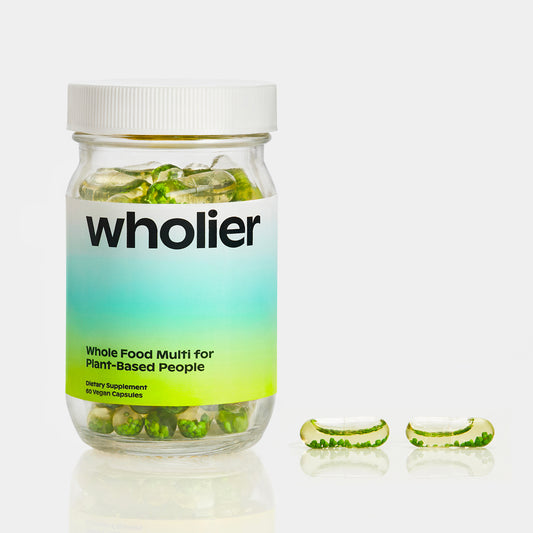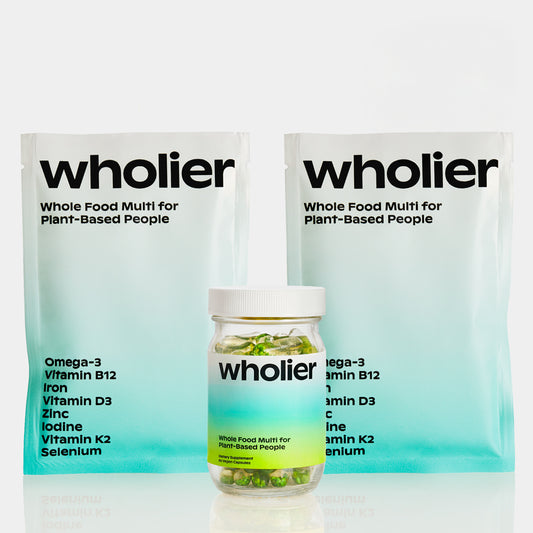
Could Your Nails Be Hinting at a Vitamin B12 Deficiency?
When we think about nails, most of us ponder over manicures, nail art, or maybe the annoying hangnail. But what if your nails could tell you more about your health than you realized? Like whispers of a secret language, your nails can offer clues to your Vitamin B12 levels.(1) This is an intriguing aspect of our body's complexity that we often overlook.
Why is Vitamin B12 So Essential?
B12, a.k.a Cobalamin, might not have the fame of vitamins C or D, but it’s every bit a superstar. It's water-soluble, which means the body doesn't store it.(2) But don't let that fool you - it's a workhorse, tackling everything from red blood cell formation to neurological function, not to mention its crucial role in DNA synthesis.(3) Even more impressive, B12 is the largest and most structurally complicated vitamin known to us.(4)
The plot thickens when we realize our bodies can't produce this vital nutrient, which leads us to the question: what happens if we don't get enough of it?
Can Your Nails Really Reveal a Vitamin B12 Deficiency?
In the quiet drama of our body's operations, Vitamin B12 deficiency often sends subtle, overlooked signals. Yet, if you've ever noticed changes in your nails, you might be witnessing a performance from Vitamin B12, or rather, the lack of it.
Research shows that a deficiency in Vitamin B12 can make your nails appear darker, more ridged, and brittle.(5) Extreme cases can even cause onycholysis - a condition where the nail lifts off the nail bed.(6) So if your nails have been looking more like villains than heroes, it might be time to check your Vitamin B12 levels.
What Other Signs Might Signal a Vitamin B12 Deficiency?
The story of Vitamin B12 deficiency isn't confined to the stage of your fingertips. It has a larger ensemble cast of symptoms. Commonly reported ones include fatigue, breathlessness, and numbness or tingling sensations in hands and feet. It can even affect your cognitive abilities, causing memory loss or confusion.(7)
In severe cases, it may lead to a dramatic condition called megaloblastic anemia - marked by larger than normal, immature red blood cells.(8) If you're experiencing any of these symptoms, it's time to consult with your healthcare provider.
How Do We Counter This Deficiency?
A plot twist awaits us in the narrative of Vitamin B12. Once we identify a deficiency, the next step involves supplementation. But here's a catch - our body's absorption capacity.
Bioavailability, the proportion of a nutrient our body can absorb and use, is a key player here.(9) The absorption rate of Vitamin B12 from supplements is a wild card, ranging anywhere from about 1% to about 20% based on the dose.(10) Considering this, the ideal daily dose would be around 150mcg.(11) But remember, everyone’s story is unique. Age, genetics, and gut health can affect absorption, making it necessary to consult a healthcare provider to craft your supplementation story.(12)
What’s the Take-Home Message?
Our bodies, like a fascinating story, are filled with signals and signs. If you're noticing changes in your nail health or other symptoms associated with Vitamin B12 deficiency, it's time to tune in and take notice. Remember to consult your healthcare provider for the most accurate diagnosis and treatment plan.
So, next time you glance at your nails, see them for the health detectives they can be. With our newfound knowledge, we can transform them from aesthetic accessories to tools for maintaining our wellbeing.
Sources:
(1) Cashman, M.W., Sloan, S.B. (2010). "Nutrition and Nail Disease". Clinics in Dermatology, 28(4), 420-425.
(2) Lachner, C., Steinle, N.I., Regenold, W.T. (2012). "The Neuropsychiatry of Vitamin B12 Deficiency in Elderly Patients". The Journal of Neuropsychiatry and Clinical Neurosciences, 24(1), 5-15.
(3) O'Leary, F., Samman, S. (2010). "Vitamin B12 in Health and Disease". Nutrients, 2(3), 299-316.
(4) Wolffenbuttel, B.H.R., Wouters, H.J.C.M., Heiner-Fokkema, M.R., van der Klauw, M.M. (2019). "The Many Faces of Cobalamin (Vitamin B12) Deficiency". Mayo Clinic Proceedings: Innovations, Quality & Outcomes, 3(2), 200-214.
(5) Ogawa, Y., Kinoshita, M., Shimada, S., Kawamura, T. (2012). "Zinc and Skin Disorders". Nutrients, 4(2), 141-164.
(6) Mayeaux Jr, E.J., Murphy, P.W. (2016). "Acrodermatitis Enteropathica". The Journal of Family Practice, 45(4), 345-348.
(7) Stabler, S.P. (2013). "Vitamin B12 Deficiency". New England Journal of Medicine, 368(2), 149-160.
(8) Green, R., Allen, L.H., Bjørke-Monsen, A.L., Brito, A., Guéant, J.L., Miller, J.W., Molloy, A.M., Nexo, E., Stabler, S., Toh, B.H., Ueland, P.M., Yajnik, C. (2017). "Vitamin B12 deficiency". Nature Reviews Disease Primers, 3, 17040.
(9) Sharabi, A., Cohen, E., Sulkes, J., Garty, M. (2003). "Replacement therapy for vitamin B12 deficiency: comparison between the sublingual and oral route". British Journal of Clinical Pharmacology, 56(6), 635-638.
(10) Rizzo, G., Laganà, A.S., Rapisarda, A.M.C., La Ferrera, G.M.G., Buscema, M., Rossetti, P., Nigro, A., Muscia, V., Valenti, G., Sapia, F., Sarpietro, G., Zigarelli, G., Vitale, S.G. (2016). "Vitamin B12 among Vegetarians: Status, Assessment and Supplementation". Nutrients, 8(12), 767.
(11) Carmel, R. (2000). "Current Concepts in Cobalamin Deficiency". Annual Review of Medicine, 51(1), 357-375.
(12) Pawlak, R., Parrott, S.J., Raj, S., Cullum-Dugan, D., Lucus, D. (2013). "How prevalent is vitamin B12 deficiency among vegetarians?". Nutrition Reviews, 71(2), 110-117.





